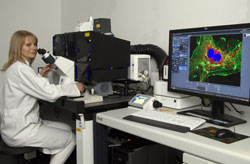Observing molecules at the nano scale

Legend: Evgenya Delyagina, researcher at the RTC Rostock, will examine genetically modified stem cells with the help of the new microscope ELYRA PS.1. Photo: © Zeiss/RTC<br>
Scientists at the Reference- and Translation Center for Cardiac Stem Cell Therapy at the University of Rostock (RTC) are now able to visualize molecules with a microscope system with a localization accuracy of up to 10 nm.
This is achieved with a new product from Carl Zeiss MicroImaging GmbH, the microscope ELYRA PS.1. Besides Osaka the RTC Rostock is going to be the first user worldwide of a series system based on this technology. The project is funded by the Federal Ministry of Education and Research (BMBF).
„Our research deals with the efficacy, safety, and the further development of stem cell therapies against heart diseases. ELYRA will support our research “ Prof. Gustav Steinhoff, head of the RTC Rostock, explains. This microscope offers new interesting possibilities, especially for gene-technical and nano-technological approaches with stem cells. To improve the therapeutical efficacy or the survivability after transplantation the cells are genetically modified by using gene transfer systems. The gene transfer is currently conducted with a novel method whose mechanism has not been fully understood yet. Neither, it is known whether the modified cells are exposed to unexpected side effects.
With ELYRA PS.1, cell processes in live cells can now be observed and documented on a molecular level for the first time. Before that, it had been possible to image cellular structures with electron microscopy with a spatial resolution of up to 10 nanometers; however, living cells were destroyed in the course of the imaging procedure.
Combining two innovative technologies, SR-SIM und PALM, the ELYRA PS.1 is able to provide super-resolution which has not been available in the fluorescence microscopy technology until today. A doubling of the resolution of a conventional fluorescence microscopy has been achieved with the SR-SIM (Super-resolution Structured Illumination Microscopy) technology.
The necessary labeling can be performed with all common fluorescent dyes. The PALM (Photoactivated Localization Microscopy) technology offers a localization accuracy of up to 10 nm using e.g. shiftable fluorescent proteins. The ELYRA PS.1 at the RTC Rostock combines the super-resolution technology with the LSM 780, which is the latest and most effective confocal Laser Scanning Microscope from Carl Zeiss.
contact:
University of Rostock
Prof. Dr. Gustav Steinhoff
Center for Cardiac Stem Cell Therapy at the University of Rostock (RTC), Director
Fon: +49 (0)381 494 61 00
Mail: gustav.steinhoff@med.uni-rostock.de
University of Rostock
Press+Communication
Dr. Ulrich Vetter
Fon: +49 (0)381 498 1013
Mail: ulrich.vetter@uni-rostock.de
Media Contact
More Information:
http://www.uni-rostock.deAll latest news from the category: Life Sciences and Chemistry
Articles and reports from the Life Sciences and chemistry area deal with applied and basic research into modern biology, chemistry and human medicine.
Valuable information can be found on a range of life sciences fields including bacteriology, biochemistry, bionics, bioinformatics, biophysics, biotechnology, genetics, geobotany, human biology, marine biology, microbiology, molecular biology, cellular biology, zoology, bioinorganic chemistry, microchemistry and environmental chemistry.
Newest articles

Skyrmions move at record speeds
… a step towards the computing of the future. An international research team led by scientists from the CNRS1 has discovered that the magnetic nanobubbles2 known as skyrmions can be…

A flexible and efficient DC power converter for sustainable-energy microgrids
A new DC-DC power converter is superior to previous designs and paves the way for more efficient, reliable and sustainable energy storage and conversion solutions. The Kobe University development can…

Technical Trials for Easing the (Cosmological) Tension
A new study sorts through models attempting to solve one of the major challenges of contemporary cosmic science, the measurement of its expansion. Thanks to the dizzying growth of cosmic…





















